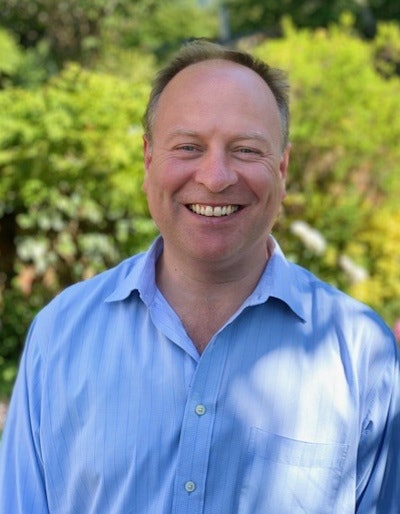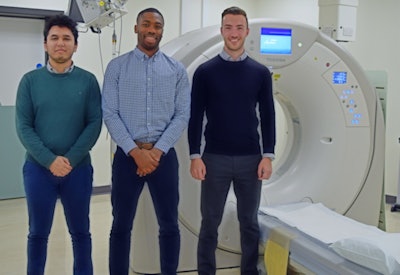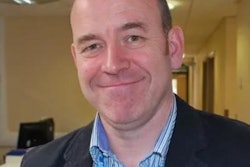
Clarity of communication lies at the heart of radiology reporting, and it's important to bear in mind that a good test is ruined by a poor report. So says Dr. Paul McCoubrie, who has spoken about his approach in a new podcast.
 Dr. Paul McCoubrie from Bristol, U.K.
Dr. Paul McCoubrie from Bristol, U.K.McCoubrie is a consultant radiologist in Bristol, U.K., and a regular columnist on AuntMinnieEurope.com. In the first volume of his book, Rules of Radiology, he educates, guides, and amuses his readers, while revealing the essential stuff that's often said in private conversation but rarely committed to print.
The RadCast team has produced a podcast in which McCoubrie shares his experiences on a wide range of topics, including the essential ingredients of a good radiology report. Drs. Jamie Howie and Uzoma Nnajiuba, who are both ST5 (year 5, specialty trainee) clinical radiologists in North-West England, ask the questions. Below is an edited version of part of this podcast.
Howie: Your Rule 23 is "Use Words Carefully." That was definitely one of my favorites. Communication is such a major part of our jobs, particularly the reports, but it's not always done that well. So what is your style like?
McCoubrie: My style is to be very concise. I really don't like hedging at all, so you'll find me very rarely sitting on the fence about things. And I'll often have a segment at the end of a report where I'll talk about the clinical consequences of any findings. I try to give guidance wherever possible.
Nnajiuba: I try to be succinct because when it comes to reports, less is more. Also, there is a pressure to produce really well-written, flowing reports, and sometimes I feel that pressure gets in the way of actually getting the report done because not everyone is gifted from a literary perspective.
McCoubrie: That's a good point. Also, we need to think more about clinicians and how they use reports. If you write more than a paragraph or so, often they will skip to the conclusion. If you're going to write a long report, then you must have very good reasons for doing so because no one's going to read it -- apart from perhaps yourself in your checking, or maybe the lawyer when they are picking over your mistakes.
I am very passionate about reports being incredibly easy to read. Use short sentences, be as clear as possible, and don't include unnecessary verbiage. If you do this, the clinicians will say: "I know when I see one of your reports -- it's short and easy to read." Otherwise, they don't read them, and then it's a waste of your time. The clinicians love it if they can pick up a report and it takes them 10 seconds to scan and cover all the major points. This is what they want.
Writing short reports is very hard to do, however. It takes years of practice and training and working at the phrases you use and your sentence structure. It's very easy to do a long report and just keep talking about the scan.
Nnajiuba: One of my favorite sentences in your book is: "Some radiologists are known for calling a spade 'a long-handled spatulous gardening implement.' " This is so true. Why do you think it happens?
McCoubrie: Radiologists do this all the time. It's almost like they learn a separate language. I think what happens is people see all their bosses using these fancy words and they think, "Ooh, that sounds so radiology-ish," and they start using those same words and phrases themselves, but they aren't always the best phrases. People get into bad habits and no one challenges them.
I care deeply about report structure and grammar and avoiding unnecessary and vague words that don't mean anything, such as "no focal active lung lesion" or "there's a possible nodule." Make your reports clear, get rid of inadvertent hedging, and get off the fence! That's my advice.
Another problem is that teleradiology reports are often held up to different standards, and teleradiology companies tend to have their own styles and approaches and internal audits. Radiologists can get marked down if they don't mention certain things, such as inconsequential renal cysts. Sometimes you just need to stop talking about renal cysts, but if you're a teleradiologist, you can feel obliged to mention every single last organ, normal or abnormal, within the scan field, which I think is wrong.
If you've said the abdominopelvic viscera are normal and there are no negatives to be talked about because it's a cancer scan, then that should be the end of it and there's nothing else to talk about.
 The RadCast team. From the left: Drs. Muhammad Khan, Uzoma Nnajiuba, and Jamie Howie. RadCast is a series of podcasts developed by clinical radiology trainees on a mission to provide a grassroots perspective.
The RadCast team. From the left: Drs. Muhammad Khan, Uzoma Nnajiuba, and Jamie Howie. RadCast is a series of podcasts developed by clinical radiology trainees on a mission to provide a grassroots perspective.Nnajiuba: I agree, but often the issue for me is that when I do try and follow that style and not mention irrelevant incidental things, I find the consultant often adds an addendum.
McCoubrie: I don't know your consultants, but I would look them squarely in the eye and say, "You really, really need to get out a little bit more." Some people are just very inclusive and a little bit retentive and they just can't let it go.
When you're a consultant, which is hopefully not too far away, then you will make your own rules, and you can decide to miss out the irrelevant negatives.
Howie: You talk about hedging. Can you elaborate on what hedging is and why it's such a bad thing?
McCoubrie: Hedging involves introducing the vagueness into a report. Sometimes it happens because you just know you've got something that genuinely could be one thing or another. But I think what often happens is you introduce vagueness into
a report, sometimes through bad habits, or sometimes through being unsure. You really should express an opinion, and you can't just leave it dangling in midair.
If you state you're not sure what this represents and if you can't get off the fence, then just stop and tell yourself this is not helpful at all. You may say that "I don't know what this is and this is what I would recommend," and for most people that's fine. But what I tell all our trainees is that you must not accidentally leave people in doubt, because that's a real threat to patient safety. If your reports aren't very clear and they leave ambiguity, then a fairly straightforward case may be interpreted differently. People say things like "negative for PE (pulmonary emboli)" which is a slightly obscure way of doing things.
Howie: "No subsegmental" is something that often gets said here. ...
McCoubrie: You're absolutely right. But the issue is that subsegmental PEs don't really matter, as we all know. But unfortunately, if you ask medics whether they do matter, they go, "Oh absolutely, definitely, anticoagulate that!" And so, in fact, what you need to do is actually protect them from subsegmental PEs by not mentioning them.
Nnajiuba: Despite really wanting clear communication, you make it clear in your book that you don't like structured reporting. Why are you so against it?
McCoubrie: Don't get me wrong, my motto is: Structure in reports is good. I'm even in favor of template reports that give you a similar structure. A very good radiology friend of mine says that all cancer scans should be structured "T, N, M: Amen" -- your report should be: tumor, nodes, metastases, and then stop. That should be the structure, and if everybody did cancer staging and restaging scans like that, then the world would be a happier place, according to my friend.
But structured, standardized, or template reports are not necessarily good. Although embraced with gusto in certain parts of the world, the very mechanistic nature of these strips out any individual style. Plus, most real-life template reports I've seen are detestably bland -- tediously long things that I'd not want my name on the bottom of. They're often unreadable, and anything unreadable just doesn't get read.
Nnajiuba: Keeping your PET reports short is a particular challenge; they're usually multiple pages long, with lots of hedges. What do you suggest here?
McCoubrie: I have seen some absolutely awful PET reports, more than any other modality. It is very radiologist-dependent and it also depends on your background and where you work and on external audits and things like that. The problem with PET is it is very sensitive and picks up a lot of things. It is a fact of life that 30% to 40% of PET scans highlight significant extra significant incidental findings that need further investigation. So, whether that is a parotid nodule or a lung nodule, you do pick up these things. Unfortunately, intrinsic to PET are incidental findings, and you can't fight it, but what you can do is to give very good guidance on it and make them compact.
Yes, PET reports are a pet hate -- excuse the pun! All you can do is to try to handle the uncertainty, but I've seen this done very badly.
Howie: Perhaps the most controversial statement of the whole book is: "Never, ever write, 'Clinical correlation advised.' " Why are you so adamant about this point?
McCoubrie: It's quite simple really. This started out as a fairly benign phrase that you could pass back as a question to the referring clinician. The phrase came about because we needed more clinical information. If I put more information in the request, then we'd be able to do our own clinical correlation. But it's become so overdone. It's just a joke phrase now, and it exists to poke fun at radiologists. I just think we need to drop it, and it needs to disappear from the lexicon. Instead, we need to use actionable and meaningful phrases.
Howie: Do you have a final take-home message?
McCoubrie: Remember that clarity of communication is everything, and a good test is ruined by a poor report.
Editor's note: You can listen to the full podcast on the RadCast Anchor page or by searching for RadCast on Spotify or Apple Podcasts.



















